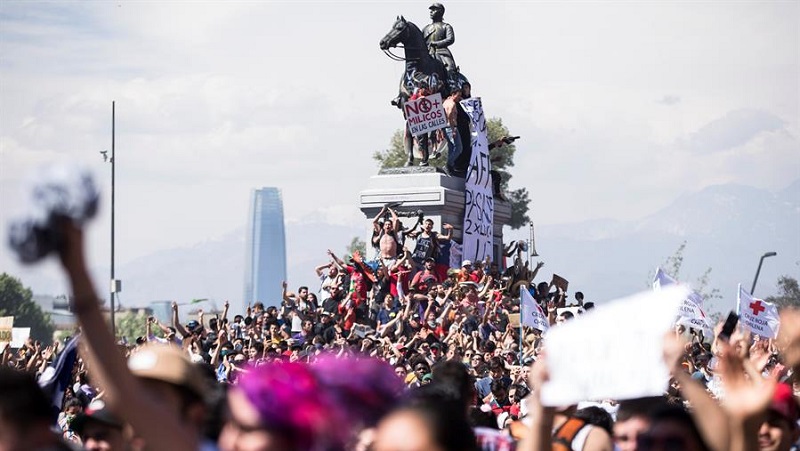As the ongoing rebellion in Chile approached the two-week mark, two forces in the parliamentary left—the Communist Party of Chile and the Frente Amplio (Broad Front)—had clearly signed on to the government’s attempts to enlist the opposition into setting up a “dialogue.” This “dialogue” is intended to keep Chilean President Sebastián Piñera from being ousted and relieve the pressure of the situation in the streets. In an interview on the radio program Pateando el Tablero [1], which broadcasts from Neuquén, Argentina, Dauno Tótoro discussed these developments and what they mean for Chile’s near- and long-term future. Tótoro is a leader of the Revolutionary Workers Party (PTR) of Chile and a member of the editorial board of La Izquierda Diario Chile.
Please tell us about the mobilizations in Chile.
Wednesday, October 30, was the 13th day of nearly continuous mobilizations in Chile, both in the capital Santiago, where I live, as well as in most of the country’s cities. Since Monday, Santiago has seen massive mobilizations in the city center. A very spirited crowd of youth, workers, and poor people filled the Plaza Italia, the city’s main square, and the Alameda, demanding “Out with Piñera!” There was a lot of anger, not only because Piñera is a supporter of the legacy of the military dictatorship, but also because he has responded with tremendous repression. Twelve days ago he declared a state of emergency, which he then rescinded after a week. There have been dozens of deaths and cases of torture, as well as sexual abuse inside the police stations. People have grown weary of this government, and in general with the political regime inherited from the military dictatorship.
Piñera announced a reshuffling of the cabinet. What was the reaction?
The cabinet reshuffling was rejected by everyone. The very next day, tens of thousands of us filled the streets to show that we are not buying that diversion. An important sector of the mobilization still clearly demanded “Out with Piñera!” and even “Let’s go to La Moneda [the presidential palace] and drag Piñera out!”
It’s nothing more than moving some chess pieces around the board. They dumped the hated Interior Minister, Andrés Chadwick, who was directly responsible for the repression, but they kept other ministers who the people absolutely despise: Minister of Education Marcela Cubillos, who people call la displicente (“the dismissive one”) because of how she treated teachers when they mobilized a few months ago; and Minister of Health Jaime Mañalich, who was expelled from medical school under some shady circumstances. The social media networks were full of posts mocking the cabinet reshuffling as nothing more than a change of faces, with the same dinosaurs still in charge.
I understand the Wednesday strike involved an important independent sector.
Wednesday revealed the role the Communist Party and the Frente Amplio (Broad Front) have decided to play in the rebellion—which is, in a word, to subvert it.
The call for a national strike on Wednesday came from the Social Unity Roundtable, which brings together the CUT (the trade union confederation), Confech (the Confederation of Chilean Students), CoNES (the confederation of high school students), and No+AFP (which organizes against Piñera’s pension reform)—all organizations led mainly by the Frente Amplio and the CP. The call was scandalous: without consulting anyone, the Roundtable raised a list of demands that did not include the fundamental slogan that has mobilized so many people during the entire period of rebellion: “Out with Piñera!” It was a betrayal.
But again, tens of thousands of people took to the streets. There were clashes in the Plaza Italia and downtown. We participated not only in the name of our political organization but also where we have been organizing, such the rank-and-file assembly Cordón Santiago Centro and the union of the Gabriela Mistral Cultural Center (GAM), one of the main cultural centers located in an enormous building in the Alameda. The GAM workers had convened an assembly, held a discussion, and then hung out an enormous banner that read: “Out with Piñera! We don’t negotiate when our people have been murdered.” That was the same perspective we brought to the demonstrations.
What is this Frente Amplio?
The Frente Amplio is a new political coalition that groups together a number of organizations, ranging from left-wing groups to the Liberal Party, which had officials serving in Piñera’s first government. It was launched by the main leaders of the 2011 student movement, Giorgio Jackson and Gabriel Boric, who back then also diverted the mobilizations. Today, as part of the Social Unity Roundtable together with the Communist Party, it proposes this policy of negotiations. It has already agreed to a meeting the government called.
Negotiations are why they’ve dropped the demand for Piñera’s ouster. They’ve also refused to develop any types of grassroots organization, coordinating committees, or assemblies. This is one of our most important political battles. We’ve been developing self-organization here in Santiago with unions and activists. In the northern city of Antofagasta, an Emergency Committee was established by a vote of the teachers’ union along with other unions, as well as high school and university students. It’s a model: a grassroots coordinating group to deepen and strengthen the roots of the movement in the schools and workplaces. The committee organized an assembly of 200 high school students and issued a national call for high schools to be occupied as spaces for organizing the struggle.
The same thing happened in the coastal city of Valparaiso, where along with dozens of activists we’ve been advocating for the creation of a regional coordinating assembly. Earlier this week, if I’m not mistaken, it issued a communiqué calling for a work stoppage until Piñera is gone, as a starting point.
The Frente Amplio and the Communist Party are posing as the left at the same time they are agreeing to participate in negotiations with Piñera. And they’re also calling for a “constitutional accusation” (a type of impeachment) against Piñera. In other words, they’re trying to subvert the rebellion by channeling it toward a constitutional solution. They want to make the people believe it’s possible to remove Piñera through a parliamentary vote.
This “constitutional accusation” is bequeathed in Pinochet’s constitution, is it not?
It’s based on a utopian mechanism inherited from the military dictatorship. Two months ago, a constitutional accusation against the Minister of Education was filed and rejected. You need a two-thirds vote of the Senate, which is full of politicians from the traditional parties, both from the right and from the New Majority (the parties of the old Concertación coalition, which held the presidency from the time military rule ended until Piñera won in 2010). They’ve already stated the obvious: They’re not going to approve a constitutional accusation against Sebastián Piñera. Even the members of the Frente Amplio and the Communist Party recognize the difficulty of what they’re pushing.
We’ve been making it very clear: the way to confront this government is not to put our trust in the institutions of the old, totally rotten political regime that the people in the streets have rejected, but rather by fighting for a general strike, with a plan of struggle, with mobilizations, rooted in coordinating groups and grassroots assemblies that discuss a program to overthrow the government.
Didn’t Communist Party leaders go along with one of one of Piñera’s spokespersons, Karla Rubilar, who condemned the violence and laid it at the feet of the Chilean people engaged in this popular rebellion? How could the CP join the mobilizations after that?
It’s part of the whole maneuver being orchestrated at the moment, not only by the right wing and the former Concertación, but also by the CP and the Frente Amplio in their desperation to negotiate and ultimately save Piñera’s skin. They want to divert the mobilizations and the enormous strength and energy they express. When Karla Rubilar condemned the violence, they all followed suit immediately: CP leaders Camila Vallejo and Daniel Jadue, as well as the main leaders of the Frente Amplio, including Beatriz Sánchez, who was its presidential candidate, along with Jackson and Boric.
This makes our fight for structures in the schools and workplaces very important, because without them, it’s difficult for the movement to see that there are political parties—including the CP and Frente Amplio—maneuvering right now to make sure nothing comes of our mobilizations. Their demands are sterile. Nothing they raise would be binding. They’ll just draw up some document that two years from now can be used for some legislation that will do nothing to resolve the central demands of these mobilizations.
One of your important demands is for a Constituent Assembly. Some sectors propose that it should be Piñera or the existing institutions that call for a Constituent Assembly. Could you tell us a little about the alternative you propose?
We’ve been raising the need for a Constituent Assembly as an emergency solution to the political and social crisis. But we call for one that is free and sovereign, based on the power of the mobilizations, and founded upon the ruins of the government and the current political regime. We have no interest in a rigged Constituent Assembly established through the regime’s “institutionality,” as has been proposed not only by the CP and the Frente Amplio, but even by the Supreme Court.
What we propose is to open up the possibility to challenge everything, on the basis of the mobilizations and overthrowing the government, through a Constituent Assembly that is democratic, with 1 delegate for every 20,000 voters. Restoring pensions, making education free, addressing wages and debt—none of these demands can be met unless we go after the profits of the capitalists. Today, a handful of families—the Lucsiks, Mattas, Angelinis, and others—hold enormous power and capital. They are as intertwined with the rightist political parties of the regime as they are with the former Concertación. We have to go after the banks, the forestry companies, the mining companies, and advance demands that confront the real power. That’s why we propose this Constituent Assembly to discuss and challenge the regime in its entirety, the regime inherited from the military dictatorship, and move forward to tear it down—not fix it up, and not come up with some institutional solution to a conflict that will not end under those circumstances.
Notes
[1] The literal meaning of the colloquial expression pateando el tablero is “kicking the board.” It has many equivalent idiomatic expressions in English, including (among others) “kicking it to the curb,” “gumming up the works,” and “upsetting the applecart.”
First published in Spanish on October 31 in La Izquierda Diario.
Translation and adaptation: Scott Cooper











